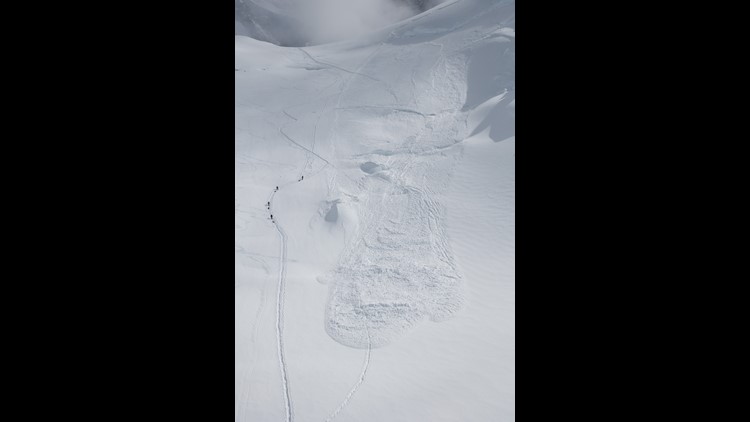(CNN) — Four Japanese climbers are feared dead following an avalanche on Alaska’s Mount McKinley, according to the National Park Service.
Park rangers are engaged in a search-and-recovery effort after the avalanche barreled down the western side of North America’s highest peak early Thursday, in a section roughly 11,800 feet above sea level, according to park spokeswoman Maureen McLaughlin.
“Given how long it’s been and how long they may have been trapped under there, it’s more of a recovery effort at this point,” McLaughlin said Saturday.
The five were traveling on McKinley’s West Buttress as one rope team, although the rope broke during the incident, officials said.
One climber survived the incident after he was swept into a mountain crevasse and was able to climb out, sustaining only minor injuries, the service reported.
Hitoshi Ogi, 69, was unable to locate his fellow climbers and descended solo to the Kahiltna base camp and reported the event late Thursday afternoon.
The missing were identified as male climbers Yoshiaki Kato, 64, and Tamao Suzuki, 63, and female climbers Masako Suda, 50, and Michiko Suzuki, 56. All are from Miyagi Prefecture and are affiliated with the Miyagi Workers Alpine Federation.
“The avalanche that occurred could have happened to anybody,” McLaughlin said.
The climbers, on their registration forms, indicated their experience included climbing peaks in Africa and Asia, but not McKinley, she said.
Named after William McKinley, the 25th president of the United States, the mountain’s summit reaches an elevation of 20,320 feet above sea level. The mountain is also known as “Denali,” an indigenous name meaning “the high one.”
“We did not ask Mr. Ogi whether they reached the summit,” said McLaughlin. “We presume they did not because the weather has not been conducive (the past week) for people to summit.”
According to the park, the team was descending Motorcycle Hill, a popular route, at about 2 a.m. when the massive avalanche occurred. The debris path was about 800 feet long and about 200 feet wide.
It is an area where avalanches are known to occur, but not of this magnitude.
“We never have had any avalanche fatalities in that part of the mountain,” McLaughlin said.
In May, a climber died after falling more than 1,000 feet down McKinley’s north face. The climber apparently tried to recover a backpack that had started to slide downhill before falling, the park service reported.
That fatality was considered McKinley’s first serious incident of the 2012 mountaineering season. Less than a week later, a 36-year-old Finnish mountaineer also died from injuries sustained in a fall during descent.
Of the 630 climbers that have returned from expeditions so far this season, only 234 reached the summit. There are 395 mountaineers currently attempting to climb, McLaughlin said. The season lasts from late April to early July.
The Japanese climbers were traveling at night, not uncommon during the summer solstice when nighttime skies are lighter and climbers want to avoid daytime heat and tricky snow conditions. The expedition began May 26.
Park rangers have an orientation session with all climbers before they attempt McKinley. The ranger staff works different elevations on the peak, providing additional information and assistance.
The Japanese consulate in Anchorage has been in contact with the families and assisted in translating conversations with Ogi.



